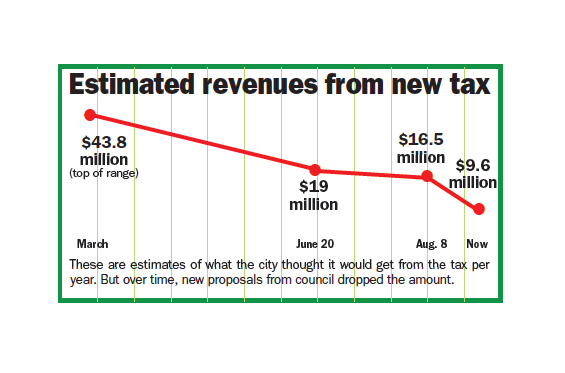
BY BRADEN CARTWRIGHT
Daily Post Staff Writer
Palo Alto City Council agreed last night (Aug. 10) to reduce the amount of a business tax it will put on the ballot this November in exchange for the business community promising not to campaign against it.
With no opposition campaign, council also put a second measure on the ballot to transfer profits from natural gas bills to other city projects.
“Something is better than nothing,” Councilman Greer Stone said.
Three council members negotiated with business representatives all day on Tuesday, Mayor Pat Burt said. After little progress all summer, the city brought in former Mayor Larry Klein to mediate and both sides moved from their original position. Still, they walked away from the table without any agreement, Burt said.
Shikada recommended yesterday a proposal that was in between the two positions. He talked to council about the importance of businesses in Palo Alto and said a political consultant told him that the tax measure would likely fail if there was organized opposition.
Shikada’s proposal, which council backed, would bring in $9.6 million in revenue.
Council considered a tax as high as $43.3 million in March but was at $16.5 million on Monday. The business side started at $5 million.
Spokesmen for the business organizations — Dan Kostenbauder of the Silicon Valley Leadership Group and Charlie Weidanz of the Palo Alto Chamber of Commerce — said their boards would accept Shikada’s proposal. They told Shikada that they would let their political consultant go.
“It has been a long journey, but our alliance will not stand in the way of this opportunity for Palo Alto to have a business tax,” Kostenbauder said. The business groups pushed council to lower the proposal by sending out mailers arguing against the tax and launching a website with testimonials from business owners. Polling from the city strengthened their position because the results showed the measure, which needs a simple majority to pass, might not win.
The business groups also threatened to oppose a second measure to transfer natural gas profits to the General Fund, which would bring in about $7 million per year, Shikada said.
In response, council lowered the business tax rate, limited its annual increase, added a $500,000 cap per business and exempted smaller businesses.
A couple of council members said they weren’t happy about bending to businesses. The tax will now bring in just a fraction of what is needed to build affordable housing and separate the Caltrain tracks from the road, Councilman Tom DuBois and Vice Mayor Lydia Kou said.
“It’s a huge disappointment to go through all this effort and at the end of the day not be able to fund very much,” DuBois said.
DuBois said individual businesses could still oppose the measure, and Kou said council was favoring businesses over residents. “We can rationalize and make ourselves feel better with the things we say, but this is not enough,” she said.
